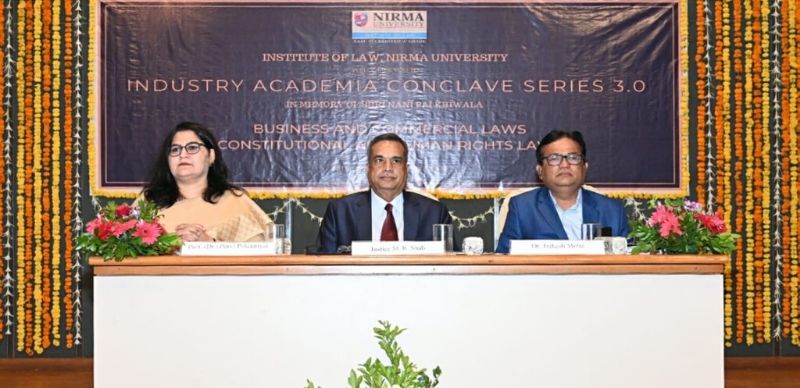
‘Granting of Frequent Adjournment is major impediment to our Justice Delivery System’, Hon’ble Justice M.R. Shah, Judge Supreme Court of India.
Frivolous adjournments are major reasons for delay of cases, said Hon’ble Justice M.R. Shah. He said that the practice of granting unnecessary adjournments should be discouraged. He was speaking as the Chief Guest at the second day of the Industry Academia Conclave 3.0 organised by Institute of Law, Nirma University. He elucidated that speedy justice is a fundamental right under Article 21 of the Indian Constitution. The hon’ble judge was of the opinion that the problem of delay in justice delivery can be tackled by taking recourse to ADR mechanisms, building infrastructural support and by providing training to judges and advocates. He empasized that recourse to section 89 of Civil Procedure Code and the use of plea-bargaining method should be encouraged.
Justice M.R. Shah started the lecture by emphasizing on the point of timely justice delivery. He through the recently pronounced Ayodhya judgment, highlighted the hard work and labour put in by Supreme Court judges to provide to a balanced decision within a mere span of 40 days. He then pointed out that pendency of cases in India is the biggest problem currently faced by Indian judiciary. He also highlighted the drastic increase of population, lack of number of courts, lack of infrastructure, inadequate budgetary allocation, accessibility of courts, judge to population ratio is worrisome, delay in expert report, time in investigation, improper court management, delay in issuing of summons are some of the major reasons for impediments in disposal of cases.
He further discussed about burning issue of Judicial Recusal. He explained that an application for recusal of judges should not only be sought in case of mere suspicion of danger but in such cases where there is apparent real danger of bias on part of judges. He also pointed out that it is for the judge to choose, if he should recuse himself or not. He also referred to the issue of judicial obstinacy as a ground for recusal of judges. He said that mere legal opinion about a matter should not be a ground for recusal of judges. Otherwise, it would promote bench-hunting and forum shopping. Therefore, as a general rule recusal of judges should only be sought on the ground of pecuniary bias.
Professor Dr Purvi Pokhariyal, Director and Dean Institute of Law, said that despite the presence of Article 39A in the Constitution of India access to justice is still a distant reality in our country. She referred to Hon’ble justice M.R. Shah as a humane judge who brought right to life of birds under the ambit of Article 21 while delivering a judgment in Gujarat High Court. She also thanked Justice M.R Shah for all the support he extended to the students of Institute of Law when he was a judge at the Gujarat High Court.
Dr Takesh Molia, Associate Professor, delivered the vote of thanks.